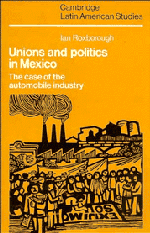Book contents
- Frontmatter
- Contents
- List of tables
- List of figures
- Acknowledgements
- Dedication
- Preface
- List of abbreviations
- Map: Location of automobile plants
- 1 Organized labour in Mexico
- 2 The Mexican automobile industry
- 3 Wages and workers in the Mexican automobile industry
- 4 The unions: a historical analysis
- 5 The unions: power and organization
- 6 Control over work processes
- 7 Union government
- 8 The labour courts
- 9 The empirical findings and the dynamics of industrial militancy
- 10 Unions and political stability in Mexico
- Notes
- Bibliography
- Index
- CAMBRIDGE LATIN AMERICAN STUDIES
9 - The empirical findings and the dynamics of industrial militancy
Published online by Cambridge University Press: 04 August 2010
- Frontmatter
- Contents
- List of tables
- List of figures
- Acknowledgements
- Dedication
- Preface
- List of abbreviations
- Map: Location of automobile plants
- 1 Organized labour in Mexico
- 2 The Mexican automobile industry
- 3 Wages and workers in the Mexican automobile industry
- 4 The unions: a historical analysis
- 5 The unions: power and organization
- 6 Control over work processes
- 7 Union government
- 8 The labour courts
- 9 The empirical findings and the dynamics of industrial militancy
- 10 Unions and political stability in Mexico
- Notes
- Bibliography
- Index
- CAMBRIDGE LATIN AMERICAN STUDIES
Summary
Chapter 2 presented a number of hypotheses about unions in the Mexican automobile industry. The point of departure was an interest in the question of whether there were systematic differences in union behaviour between the new ‘independent’ unions and the old-style ‘official’ unions. A number of different dimensions of union behaviour – militancy, control over work processes, internal democracy, representation of workers in the labour courts, etc. – were examined in subsequent chapters. The present chapter will tie together the results of previous chapters in order to clear the way for a discussion (in chapter 10) of the implications of the findings of this research for political processes in Mexico.
The first dimension of union behaviour which was examined was union militancy, defined here as strike-proneness. The hypothesis that the three independent unions would be more strike-prone than the six official unions received only qualified support. The three independent unions (Nissan–Cuernavaca, VW and DINA) were, indeed, among the most strike-prone in the industry. However, two of the official unions (GM–DF and Ford) were also strike-prone. It was therefore decided to amend the original hypotheses, and see whether the dichotomy militant–conservative was a better predictor of union behaviour than the dichotomy independent–official.
As the available evidence on the various dimensions of union behaviour was reviewed in chapters 4 to 8, a strikingly consistent pattern of intercorrelations emerged.
- Type
- Chapter
- Information
- Unions and Politics in MexicoThe Case of the Automobile Industry, pp. 155 - 163Publisher: Cambridge University PressPrint publication year: 1984



